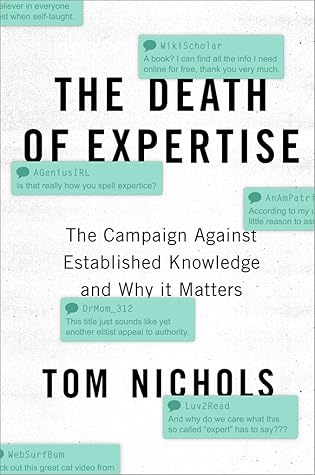More on this book
Community
Kindle Notes & Highlights
This isn’t to let experts, especially expert communities, off the hook for massive failures of insight. While no one Soviet expert in the 1970s could predict the fall of the USSR by 1991, the hardening of expert opinion around the opposite view—that the collapse of the Soviet state was practically impossible—is a sizable error in judgment that should haunt that field. (Unfortunately, it does not; for twenty years, most Russia specialists have shied away from examining each other’s mistakes.)
Moreover, laypeople must accept that experts are not policymakers. Experts advise national leaders and their voices carry more impact than those of laypeople, but they do not make the final decisions. In a democracy, even a highly regulated and bureaucratized republic like the United States, few experts are sole policymakers.
nuclear triad
What Rhodes said, however, was different, and far more damaging to the relationship between experts and public policy. In effect, he bragged that the deal with Iran was sold by warping the debate among the experts themselves, and by taking advantage of the fact that the new media, and especially the younger journalists now taking over national reporting, wouldn’t know any better. “The average reporter we talk to is 27 years old, and their only reporting experience consists of being around political campaigns,” Rhodes said. “That’s a sea change. They literally know nothing.”
First, experts are not puppeteers.
Second, experts cannot control how leaders implement their advice.
Third, no single expert guides a policy from conception through execution, a reality that the public often finds bewildering and frustrating.
Fourth, experts cannot control how much of their advice leaders will take.
Is the earth’s climate changing? Most experts believe it is, and they believe they know why. Whether their models, extrapolated out for decades and centuries, are accurate is a legitimate area for debate. What experts cannot answer is what to do about climate change. It might well be that Boston or Shanghai or London will be underwater in fifty years, but it might well also be that voters—who have the right to be wrong—will choose to shift that problem to later generations rather than to risk jobs (or comfort) now.
This is the worst of all worlds, in which both democracy and expertise are corrupted because neither democratic leaders nor their expert advisers want to tangle with an ignorant electorate. At that point, expertise no longer serves the public interest, but the interest of whatever political clique is taking the temperature of the public at any given moment. We are already perilously close to this outcome in modern America.
In 1942, President Franklin D. Roosevelt asked radio listeners to go and purchase maps so they could follow along as he narrated the progress of World War II. Maps quickly sold out across the country. In 2006, fewer than sixty-five years later, a national study found that nearly half of Americans between the ages of eighteen and twenty-four—that is, those most likely to have to fight in a war—did not think it was necessary to know the location of other countries in which important news was being made.
Rather, Americans now think of democracy as a state of actual equality, in which every opinion is as good as any other on almost any subject under the sun.


